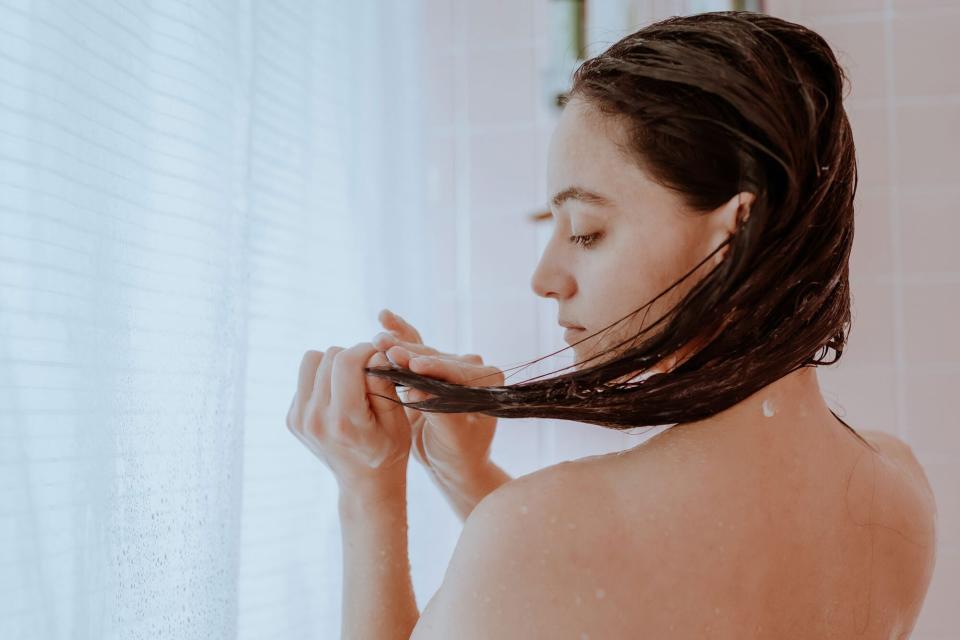What Exactly Are Parabens Anyways?
What are parabens? This is a question that many dermatologists get asked a lot, and rightly so.
While the ingredient has become a controversial topic over the years, it does have its benefits. For example, if you've ever wondered how some of your cosmetics last a very long time without going moldy, the answer could be because they contain parabens.
"Parabens are a group of chemicals used as preservatives in skincare, makeup, and hair care products," says Dr. Blair Murphy-Rose, MD, FAAD, a board-certified cosmetic and medical dermatologist. "Water-based products can grow bacteria, mold, and other microorganisms that are harmful when applied to skin and hair — preservatives, like parabens and others, work to prevent this growth."
Parabens first became the subject of controversy in 2000 when scientists suggested that they might be endocrine disruptors; which means when absorbed by the body, they can decrease or increase normal hormone levels, mimic the body's natural hormones, or alter the natural production of hormones.
With the recent popularity of the clean cosmetics movement, more research is being done on the safety of parabens with regards to long-term health effects. Below, Dr. Murphy-Rose shares more on what you should know about parabens.
Are Parabens Safe?
The question concerning whether parabens are safe or not continues to be debated — the short answer is, several studies indicate that parabens may indeed pose a threat.
"Parabens have the potential to be harmful," says Dr. Murphy-Rose. "Data suggests that parabens can disrupt hormones in the body which may increase the risk of some cancers, particularly breast cancer, they may also be harmful to reproductive organs, potentially affecting fertility and birth outcomes, as well as interfering with the body's natural production of hormones."
Numerous studies and data from bio-monitoring surveys have shown that parabens from skincare products do enter the body. "One 2006 study found parabens in urine samples taken from adults in the US," says Dr. Murphy-Rose. "The chemicals are absorbed through the skin, enter the bloodstream and are eventually excreted in the urine. Many studies have shown markedly higher levels of parabens in the urine of people who use cosmetics regularly, compared to counterparts who do not."
Five different parabens (isopropylparaben, isobutylparaben, phenylparaben, benzylparaben, and pentylparaben) have been completely banned in the EU, while others are strictly regulated because they are believed to be endocrine disruptors. "Long-chain parabens have shown the highest potential for harm, these include propylparaben, isopropylparaben, isobutylparaben and butylparaben," says Dr. Murphy-Rose.
In September 2020, California became the first state in the country to ban the use of isobutylparaben and butylparaben in cosmetics and personal care products in the Toxic-Free Cosmetics Act. "While we cannot definitively say that all parabens are harmful, avoidance of products containing parabens, or even a reduction of use, seems wise since there are good alternatives that can be used as effective preservatives," says Dr. Murphy-Rose.

Getty Images
How Can I Check To See If My Products Contain Parabens?
If you're concerned about parabens and other chemical preservatives in your cosmetics, the best thing to do is check the labels on any beauty products you buy.
Most cosmetic companies clearly state whether their products contain parabens or any other type of chemical used in preservatives. Methylparaben, ethylparaben, propylparaben, and butylparaben are common parabens found in several products including shampoo, toothpaste, shaving cream, and even food.
Are There Any Alternatives If I Don't Want to Use Products That Contain Parabens?
With so much uncertainty surrounding the safety of products containing parabens, it's completely understandable if you'd rather stay clear of parabens altogether. But don't worry, that doesn't mean you have to stop washing your hair or wearing makeup.
You'll be pleased to know that there are many paraben-free products on the market today that usually contain chemicals like phenoxyethanol, sodium benzoate, benzoic acid, and benzyl alcohol; commonly used paraben-alternatives that have not shown potential health risks. "If formulated properly, products that do not contain parabens can be safely preserved," says Dr. Murphy Rose.

 Yahoo Finance
Yahoo Finance 